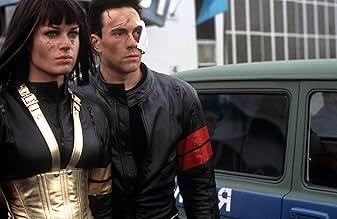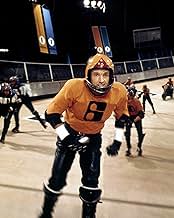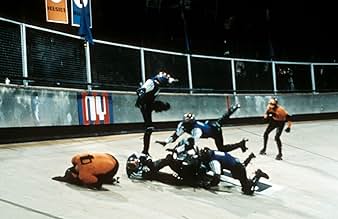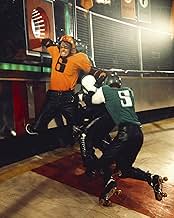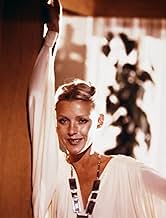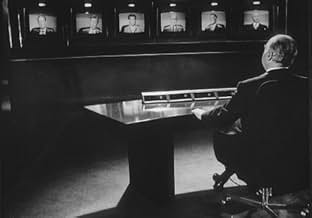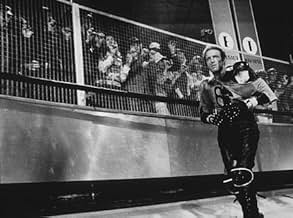Dans un avenir contrôlé par les entreprises, un sport ultra-violent connu sous le nom de Rollerball est suivi par le monde entier alors qu'un de ses puissants athlètes est prêt à défier tous... Tout lireDans un avenir contrôlé par les entreprises, un sport ultra-violent connu sous le nom de Rollerball est suivi par le monde entier alors qu'un de ses puissants athlètes est prêt à défier tous ceux qui veulent le mettre hors jeu.Dans un avenir contrôlé par les entreprises, un sport ultra-violent connu sous le nom de Rollerball est suivi par le monde entier alors qu'un de ses puissants athlètes est prêt à défier tous ceux qui veulent le mettre hors jeu.
- Victoire aux 1 BAFTA Award
- 4 victoires et 5 nominations au total
- Bartholomew's Aide
- (as Rick Le Parmentier)
- Madrid Biker #1
- (non crédité)
- Houston Team Rookie
- (non crédité)
- Biker
- (non crédité)
Avis à la une
But, what am I trying to say?. Rollerball, folks, is one of the most perfect examples of the good/evil infinite fight. One man alone, discovering the truth behind is comfortable life, losing is goods and privileges, gets himself in a life-or-dead final battle against the real enemy: the Corporation (¿who else?). The image of James Caan skating alone into the game arena with the crowd claiming his name louder and louder is simply unforgettable. GREAT movie.
And remember: Take care, there are many powerful Corporations around you.
I had some vague notion of the storyline, but I tried not to read the case or liner notes and take in the movie on a first impression. Released in the summer of 1975, there are definite and readily apparent influences of earlier films, not the least of which being Stanley Kubrick's "A Clockwork Orange." The colors, the film stock, the editing style are all reminiscent of that earlier, similarly-themed master work, yet I don't believe it detracted from this film at all.
Supposedly set in the year 2018 (though this is never established in the movie, that I could tell), corporations have replaced governments and managed to eliminate war, poverty, disease and bad hair days. People don't have too much of a say in what goes on around them, but they're all very physically comfortable. Of course, the violent nature of the human beast must be satisfied, and it is -- in the gladitorial ring of the world's most popular sport, Rollerball. The game consists of two teams (from cities all over the world) skating and motorbiking around a 1/8-mile track, trying to get a steel ball into a goal. As the course of the season progresses, more and more limitations as to what constitutes fair play are removed, and by the final, the melee is total.
James Caan plays the Michael Jordan, Wayne Gretzky and Joe Montana of Rollerball, Jonathan E.. He's the biggest star in the world, but he's also a thinking man, and when the corporation which owns his team wants him to retire, he refuses, wanting to know first why they'd want him to retire when he's playing at his best.
The rest I leave to the viewer to find out. I can only say it is a very well-crafted script with plenty to say about violence, the spirit of the individual man, and the bloodlusts that a happy and idle populace can muster. Very well-filmed with touches of brilliance in editing and framing.
A detraction which really couldn't be helped involves the portrayal of the future. Director Norman Jewison couldn't know what the world of forty years in his future would be like, so he took the wise route of not making it all that different from 1975, but with subtle changes (such as the interesting but impractical "multivision" concept in which all TV sets have a large screen and three smaller screens above it, each showing different but related pictures). The result, though infinitely preferable to lots of neon and superfluous antennae, is that the place looks like 1975 with slightly cooler gadgets. I can't tell you what 2018 will look like, but it won't look like that.
Interestingly, the "corporate inevitability" concept of the future, which I believe Jewison meant earnestly, plays out much more as a satire of the opposite, a communist world. Much of what the coroprate culture says, as personified by John Houseman's Mr. Bartholomew, sounds much like the rhetoric of communism -- people are fed and comfortable and happy, but the individual is beholden to the group at all costs. Indeed, some of the words of description of the culture seem lifted straight from Marx and Engels.
The DVD leaves something to be desired, though. The picture is a lot dirtier than I'd like, especially in still-shot scenes. The color is muted, though this may be part style, and some shots seem positively muddy.
The remastered 5.1 soundtrack is a disappointment. The rear speakers get very little play. One particular effect of note, I must concede, is one moment when you can hear the ball roll all the way around the arena, and it's as though you're standing in the center.
In all, it's an excellent movie, which I can't recommend enough, but if the disc had been any pricier than it was, I would have felt as though I was somewhat taken.
Perhaps after the release of the upcoming remake, there will be a better special edition.
But in both films, we see the same powerful strategy: a complex, philosophical brain-twister beneath a deceptivly simple exterior. "Fiddler on the Roof" was seemingly a linear story about a struggling Jewish family's good & bad times. But the real meat of the story was about the conflict between old ways and new (tradition vs. progress). Here in "Rollerball" we have another seemingly linear story about an athlete in a violent, futuristic sport. But the real meat is the conflict of brutal human nature vs. suppression (again, a sort of "tradition vs. progress"). As with "Fiddler on the Roof", director Norm Jewison doesn't hit us over the head with any preachy sermon but instead leaves us to digest the situation.
"Rollerball" has the same powerful, brooding quality that we see in many of the 70s scifi masterpieces, like "THX 1138", "Soylent Green", "Planet of the Apes", "Blade Runner" (yeah I know that one was 1982), and the one that started them all, "2001: A Space Odyssey". Cold, sterile sets, disturbing situations and powerful use of silence characterize these films. By today's standards they might be considered slow, but depending on how you like your scifi, that might be right up your alley.
In a nutshell, the story is about a futuristic society that has largely done away with civilian violence. It has done this by "subsidizing" violence by way of a global pasttime: a hyper-violent sport called Rollerball. Note: as a parallel story, we learn that cut-throat corporate competition has been similarly squelched by the government creating monopolies. And thus society finds peace. Or does it? You can probably see the brilliant metaphors being woven here. This isn't an ordinary scifi romp, it's a powerful socio-political allegory. It cuts to the heart of human nature the way the great writers H.G. Welles, Mary Shelley and George Orwell did. No, you won't see a lot of laser battles, spaceships and aliens. But here you'll see an excellent example of what scifi was designed to do: comment on our current human condition by creating a fictional (extreme) scenario as a cautionary tale.
Excellent, and I mean EXCELLENT performances by James Caan (The Godfather, Misery), John Houseman (The Paper Chase, The Fog), Maud Adams (3 James Bond films), Moses Gunn (every 70s TV show from Hawaii 5-O to Shaft), and a particularly gripping performance by Pamela Hensley (Princess Ardala in "Buck Rogers" homina homina) make this an all-star powerhouse of 70s talent.
The music deserves a special mention of its own. From the opening notes of Bach's Toccata in Dm (the creepy "Dracula" theme) to Albinoni's haunting Adagio in Gm (check it out on YouTube... saddest song ever), "Rollerball" doesn't hold back.
They don't make 'em like this anymore. But there are a few modern scifi films that come close: "Moon", "District 9" and "Solaris" come to mind.
If you liked the films I mentioned in this review; if you liked the 70s classics "Catch-22" and "Coma" and "Stepford Wives"; if you like films that are both entertaining and works of art, do NOT miss Rollerball.
For laughs, after you watch Rollerball (1976), check out the remake done in 2002 ...and see how far we've come :/
James Caan is fantastic as Johnathan E, the Michael Jordan of Rollerball. He continues to succeed in a sport designed to show the futility of individual effort. The sport is constantly changed to stop him, yet he continues to overcome every obstacle.
John Housman is electrifying as the head of the Energy Corporation, owners of the Houston Team. He has conspired with his peers to keep the masses down and use this sport to both distract them and show them that the individual can't succeed. He grows more desperate as Johnathan E defeats his schemes. He tries every trick without success.
The supporting cast is filled with great actors, like Moses Gunn, John Beck, Sir Ralph Richardson (not John Gielgud, as one reviewer stated), Maude Adams, and Shane Rimmer.
The film demonstrates that the individual can triumph over insurmountable odds and cautions against corporate control of society. It uses both allegory and speculation beautifully, and packages it with thrilling action. The remake was destined for failure because it couldn't see beyond the action. The action was only window dressing for the greater themes. If only more recent sci-fi films were this thought-provoking, or other films for that matter.
Le saviez-vous
- AnecdotesMany of the extras in the film received an additional wage in order to cut their fashionably long hair so the look of the film would not be tied to the era in which it was made.
- GaffesAt the beginning of the New York game, after many moments in the film where different characters have repeated that there would have been "no time limit", the scoreboard shows the countdown (starting from 20.00).
This is not actually a goof, as the game was still going to have 20-minute periods, but there was going to be no limit to the number of periods, hence "no time limit".
- Citations
Bartholomew: Sweet dreams, Moonpie. That's a bad habit you've got there. You know what that habit will make you dream, Moonpie? You'll dream you're an executive. You'll have your hands on all the controls, and you will wear a gray suit, and you will make decisions. But you know what, Moonpie? You know what those executives dream about out there behind their desks? They dream they're great Rollerballers. They dream they're Jonathan; they have muscles, they bash in faces.
- ConnexionsFeatured in Brubaker (1980)
- Bandes originalesToccata and Fugue in D minor, BWV 565
(uncredited)
Composed by Johann Sebastian Bach
Performed by Simon Preston and the London Symphony Orchestra
Conducted by André Previn
Meilleurs choix
Détails
- Date de sortie
- Pays d’origine
- Langue
- Aussi connu sous le nom de
- Rollerball: los gladiadores del futuro
- Lieux de tournage
- BMW Building, Munich, Bavière, Allemagne(Energy Corporation headquarters)
- Sociétés de production
- Voir plus de crédits d'entreprise sur IMDbPro
Box-office
- Budget
- 6 000 000 $US (estimé)
- Durée
- 2h 5min(125 min)
- Couleur
- Mixage
- Rapport de forme
- 1.75 : 1



